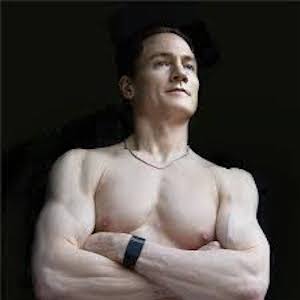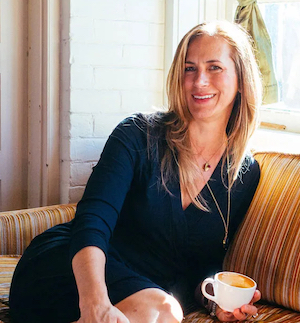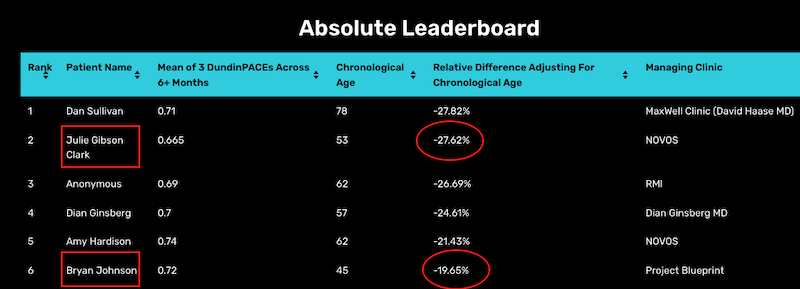Six Simple Tips for Longevity

Six simple tips for longevity? Can it really be that easy to reduce your biological age? Well, I said “simple”, but it might not be that easy, because you already know what to do — but have you? I share some compelling examples that might inspire you to get going.
⦿ The first simple step for longevity is to stop eating ultra processed foods. ⦿ Then work on resistance training, eating plant foods, shortening your eating window, managing stress and sleep. ⦿ Experts and two practitioners demonstrate what can be achieved.
None of the six simple tips for longevity that I’m about to tell you about will knock you off your chair. Undoubtedly, you’ve heard them all before. But I ask you — how young are you for your age?
In other words, how much below your chronological age is your biological age?
You probably don’t know, and in fact, so far there is no one definitive test that can tell you. Of course, how you feel counts big time, but if you knew that specific age-defying interventions could actually make you younger, perhaps rather just knowing about them, you’d practice them.
That’s what Bryan Johnson and Julie Clark Gibson are doing with astounding success. But this story does not begin with them, but rather with Idil Karsit.
Why Idil Karsit Is Dumping Ultra Processed Foods
London multimedia journalist Idil Karsit is your typical professional racing through her day to do her work. And like for a lot of us, nutrition goes by the wayside — food that’s fast to buy and fast to eat is her typical choice.
In the video below, Ms. Karsit briefly takes us along her rushed day of fast food choices, and then has interviews with Tim Spector, a professor of genetic epidemiology and nutrition researcher Dr. Kiara Chang about her food choices, and the long term damage that consuming so much ultra-processed foods can have.
(Read my post, How Ultraprocessed Foods Can Ruin Your Brain and Gut.)
The video is entertaining, informative and only 9:24 minutes long, so I encourage you to watch it.
If you watched Karsit’s video, you saw that much of her daily food choices are ultra processed. Not good, A study from 2021 discovered that in the U.S. and U.K., over half of the calories consumed are from ultra-processed foods, with other high- and middle-income countries ranging from 20 to 40%. The alarming revelation is that recent studies connect the consumption of these foods to severe conditions such as diabetes, obesity, and even cancer.
This is why the first of the six simple tips for longevity is to dump the ultra processed foods.
Simple Tips for Longevity #1: Dump the ultra processed foods.
In an interview with Tim Spector, professor of genetic epidemiology at King’s College London and co-founder of ZOE, a personalized nutrition app, Karsit shows him her lunch menu – a tuna sandwich, lemonade, and a bag of chips. Dr. Spector critiques the choices, pointing out the undesirable elements like palm fat and wheat starch, emphasizing the hidden health risks in seemingly healthy options.
The prevalence of ultra-processed foods is staggering, with over half of the calories in the average U.K. household coming from such sources. The industry, valued at $34 billion and employing over 400,000 people, has flourished. While the British Food and Drink Federation defends food processing for its benefits, the shift from preservation to convenience has raised concerns about health implications.
Examining the historical context, the evolution of food processing traces back a million years to early human interventions like cooking with fire. However, the modern era has witnessed a surge in chemicals meticulously designed by food scientists to enhance taste, color, and texture, promoting overconsumption.
Dr. Kiara Chang, author of an Imperial College London study, links ultra-processed food consumption to an elevated risk of cancer, obesity, and type-2 diabetes. These findings underscore the critical need to address the global burden of non-communicable diseases resulting from unhealthy behaviors, including poor dietary choices.
Like in the United States, the U.K. grapples with high obesity rates, compounded by food insecurity. The cost disparity between healthier and less healthy options, especially fruits and vegetables, exacerbates the challenge. Rebecca Tobi from the Food Foundation stresses the necessity for systemic changes led by government and businesses to alter the food environment.
But why wait for the government. It’s your life, grab the reins, and steer yourself away from ultra processed foods that will ruin your health and toward a lifestyle that will enable you to put more healthy years in your life.
$2 million vs $1,296
You may have heard about Bryan Johnson. He gets a lot of press, which isn’t surprising given that this former tech entrepreneur spends about $2 million a year on a variety of doctors and anti-aging treatments, including a strict plant-based diet, a vigorous exercise routine, daily supplement, stem cell therapy, hormone replacement therapy, hyperbaric oxygen therapy, and various other interventions to reverse his biological age.
By his account, it’s working. Johnson claims to have reduced his biological age by five years. He has said that he is “on track” to achieve his goal of reversing his biological age to 18 by the time he is 50.
To track his age reversal process, Johnson and his primary anti-aging doctor Oliver Zolman, created a leaderboard at Rejuvenation Olympics that tracks the relative difference between participant’s chronological and biological age, as measured by the DundinPACE test.
The DundinPace test
DunedinPACE is a DNA methylation biomarker of the pace of aging. It was developed by researchers at the University of Otago in New Zealand using data from the Dunedin Study, a longitudinal birth cohort study that has been following over 1,000 people born in Dunedin, New Zealand, in 1972 and 1973.
DunedinPACE is based on the idea that DNA methylation, a chemical modification of DNA, can be used to measure the pace of aging. DNA methylation patterns change over time, and certain methylation patterns have been associated with aging-related diseases and conditions.
To develop DunedinPACE, the researchers measured DNA methylation levels in over 1,000 Dunedin Study participants at different ages. They then used statistical methods to identify a set of DNA methylation markers that were associated with the pace of aging.
Although still under development, DunedinPACE has been shown to be a reliable and accurate predictor of aging outcomes. In the Dunedin Study, DunedinPACE was associated with a number of age-related outcomes, including cognitive decline, physical function decline, and mortality.
People on the Rejuvenation Leaderboard post their DunedinPACE biological age results, which are ranked by difference between chronological and biological age.
This test is widely available, including by these companies:
- Novos
- TruDiagnostic
- Rupa Health
- InsideTracker
- Verve Therapeutics
To get tested, you will need to provide a blood sample. The blood sample can be collected at a doctor’s office or at a home collection service. Once the blood sample is collected, it will be sent to a laboratory for analysis.
It’s through this test that we learned that Julie Clark Gibson is aging slower than Bryan Johnson; in fact, she’s currently number two on the list, whereas Johnson is number six, as this screen shot shows:
Apply Yourself to the 80/20 Rule
As reported in the article, Woman Beats Bryan Johnson in His Own Game: Aging Slower on a Budget, Julie Clark Gibson spends just $108 a month on her fitness regimen — that’s $1,296/yr vs Johnson’s $2 million.
That money is spent on gym membership and supplements.
It can’t be that simple, you say, and you’re absolutely right, because the details matter.
Many of us have a gym membership and take supplements, but haven’t achieved what Gibson has, and that’s because of how she uses these assets:
- Her gym membership enables her to exercise consistently and vigorously, as well as utilize the sauna and cold plunge.
- Those supplements are just that — compounds that supplement her plant-based diet that she eats within an eight-hour time frame, fasting the rest of every 24-hour period.
As reported by Fortune Well, “Clark starts her day between 4:45 and 5 a.m. She sends her 17-year-old son off to school and then hits the gym for strength and cardio workouts. She fasts for about 16 hours overnight, eating her first meal between 10 and 11 a.m. At least three times a week, Clark uses a sauna for 20 minutes before a cold shower. While working, she eats 16 ounces of vegetables a day, a mix of raw celery, radishes, carrots, peppers, and blanched broccoli along with a salad or soup. She meditates for 20 minutes in the early afternoon.”
What Clark does is just a small fraction of what Johnson does to reduce her biological age, but because she’s applying herself to the 80% that moves the needle the most — exercise, nutrition, time-restricted eating, sleep and stress management — she’s getting big results, results that you can get as well.
Simple Tips for Longevity
So, at the start of this post I told you that the first of the six simple tips for longevity is to dump the ultra processed foods. Now let’s add the other five that mirror what Gibson does, and on a budget no less:
- Tip #2: Find a fitness routine that you enjoy and can stick to. This doesn’t have to be expensive or time-consuming. A simple 30-minute workout three times a week can make a big difference.
- Tip #3: Focus on strength training. Strength training helps to build muscle mass, which slows down the aging process.
- Tip #4: Eat a healthy diet, mostly plant food. Eating nutritious foods gives your body the fuel it needs to function properly and repair itself.
- Tip #5: Get enough sleep. Sleep is essential for cell repair and regeneration.
- Tip #6: Manage stress. Stress can accelerate the aging process, so it’s important to find healthy ways to manage it.
Yes, they are simple, and yet so few of us practice them. Perhaps now that you know how much they can improve how you age, you might choose one of the six simple tips for longevity to practice, and once it’s a habit, grab another.
Your Takeaway
I began this post with a sad story about how many of us eat and the resulting deleterious impacts on our health. What we eat matters. You can’t subsist on an ultra processed diet and expect th the last ten or 20 years of your lifespan will be healthy.
I then pivoted to what’s most essential for healthspan — or even reducing your biological age — as Bryan Johnson and Julie Clark Gibson have done. But they’ve done it differently, or perhaps to be more accurate, Gibson took those parts of Johnson’s protocol that makes the biggest difference, the 80/20 rule.
You can do this too!
Refer to Gibson’s tips that I put in bullet points immediately above, and focus on implementing one at a time.
Here are some resources to guide you:
Hope this helps!
Last Updated on November 18, 2023 by Joe Garma






